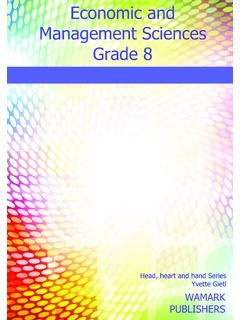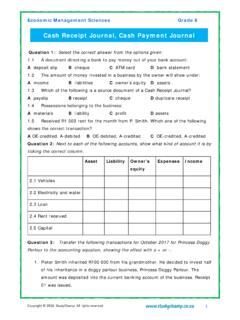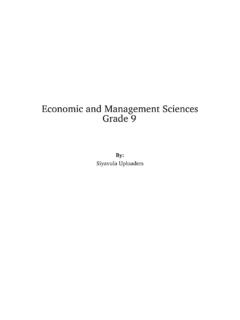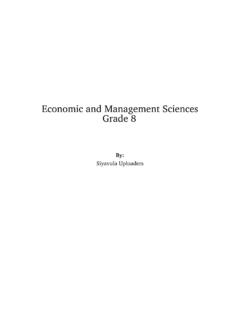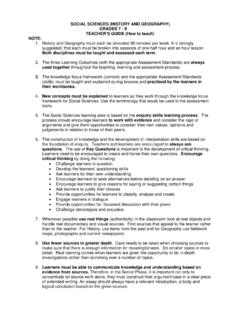Transcription of Economic and Management Sciences Grade 7
1 Grade 7 Economic and Management SciencesYT Gietl Term 1 - 4 Grade 7 Alongside the enriched EMS 8 and 9 workbooks, we also have condensed versions. This table will explain the differences and benefits of each. ENRICHED EMS WORKBOOKS CONDENSED EMS WORKBOOKS Revision Top ics and Activities * *Enrichment Topics and Activities **Tear - out Activities 22 23 11 13 Set out in SUBJECTS namely: Economics, Financial Literacy and Entrepreneurship **Set out Term 1 4 in TOPICS as per CAPS **Price incl. VAT R 160 R 160 R 120 R 120 ENRICHED VERSION VS CONDENSED VERSIONThis version suits schools with 3 or more lessons allocated to EMS per cycle. The topics covered will prepare learners for Grade CAPSThis version suits schools with very limited time have fewer than 3 lessons per cycle or have allocated more time to onlyECONOMIC AND Management Sciences Grade 7 TERM 1 - 4 INDEXLEARNER SUPPORT MATERIALPAGEACTIVITYPAGE Personal Goal Statement Continuous Homework Assessment Plot your ProgressTERM 1 7 - Money - Cash and Credit 25 - 26 Needs and Wants 15 - 18 PROJECTASSESSMENTNUMBER123451 -2 3 - 4 5 - 661 - 6271 - Goods and Services21 - The role of households as consumers and producers How to use goods and services efficiently and effectivelyASSIGNMENTTERM concepts Assets 39 - 41 Liabliliteis42 - 43 Personal
2 Income and Expenses 44 - 47 Business Income and Expenses 48 - 54 Transactions55 - 58 Personal Net worth Statement 59 - 60 27 - 2829 - 3037 - 38 TERM Definition of an entrepreneur63 - 64 TERM Productivity - Inputs vs Outputs 93 - 9479 - 809 9 - Historical development of moneyASSIGNMENTCASE STUDY Business Plan for Entrepreneurs day 65 - 66 Target Market 67 - 68 Production costing 69 - 70 Break even point 73 - 74 Marketing 4 p's 75 Marketing Plan 76 SWOT Analysis 77 - 78 Advertising 83 - 84101123 - 24 PRESENTATION19 - Formal and Informal Businesses 31 - 36 PROJECT CASE STUDY PROJECT81 - 82 PROJECT85 - 86 RDP89 - 90 Urban and Rural challenges91 - 92 Government and Apartheid87 - 88 PROJECT95 - 98 Savings - investment and community 99 - 108 Banking in South Africa The Reserve Bank and DTI's 109 - 112 RESEARCH113 - 114 FORMAL AND INFORMAL BUSINESSES Informal businesses are characterised by the following: No written contracts of employment No medical aid or pension fund No unemployment insurance UIF No tax contributions Labour laws (Rights and Responsibilities) are notrelevant or The growth of informal businesses are because of a number of reasons including.
3 Increased urbanisation of blacks (Migration due to hardships andpoverty) Slow pace of Economic growth Incidence of jobless growth Decreased incidence of formal employment Costs and regulations involved in starting a formalbusiness Limited education and training opportunities Increasing demand for low cost goods and servicesAlmost 70% of people who start an informal business do so because they are unemployed and have no alternative source of income. These businesses are not VAT registered. Businesses only need to register for VAT if the business turnover exceeds R 1 000 000 turnover per annum. In 2013 more than 50% had a turnover of R1500 or less in the month and less than 10% of businesses made net profits of more than R6000.
4 According to Stats South Africa, in 2013 there were 1, 5 million people running an informal business, an increase from the 1, 1 million recorded in 2009. Informal businesses are predominantly run by black Africans, persons aged 35 44 years, and those with lower levels of education. Examples of the different types of informal businesses oPersonal services - hairdressing,bookkeepingoManufacturing - carpentry, sewingoBuilding, arts and crafts -pottery, bricklaying, beadworkoEntertainment and transport -musicians, taxi servicesThese are also examples of formal businesses. 31 Watch the YouTube videos linked on page Advantages of informal businesses Contributes to the South African economy. Reduces unemployment and poverty.
5 Entrepreneurs are able to supportthemselves. Easy to start, with no overheads or rent to pay. The entrepreneurs learn skills that they can use in the formal sector later Disadvantages of informal trading Pay no tax and the government loses out on revenue. No control. This can lead to illegal or unsafe activities. Suffer from a lack of financial support and access to markets, competition and consumer demands, skills shortages and not always sustainable Some businesses only grow to a point where they can afford to look after theirfamilies; they don t expand and create more jobs for Different informal businesses form associations to regulate the specific industry they are in. Some examples are: South African Black Taxi Association (SABTA) African Builders Association (ABA) National Stokvels Association of South Africa (NASASA)2.
6 Formal BusinessesThe total number of people employed by formal businesses recorded for the period October 2015 - December 2015, was 1 Give an example of a formal business in each of the industries. Wholesale and retail trade _____ Repair of motor vehicles/cycles _____ Personal and household goods _____ Hotels and restaurants industry _____ Financial and Insurance _____ Real estate and business services industry _____ Transport, storage _____ Communication industry _____ Electricity and fuel _____ Construction and mining _____32 Makro and SparJob losses reported for the same period include construction (10,000 jobs), the mining industry (6,000 jobs) and the manufacturing industry 31 0000 jobs. ACTIVITY 2 List 5 advantages and disadvantages of owning a formal business.
7 ACTIVITY 3 List goods/ services that are consumed by the following examples of formal and informal businesses. CONSUME PRODUCE CONSUME PRODUCE FORMAL BUSINESSINFORMAL BUSINESSB icycle RepairProduce SecurityProducts33 ADVANTAGES DISADVANTAGES Acces to finances due to Financial recordsBudgets for marketingAccess to markets and better prices when buying bulkAccess to contracts and taken more seriously Greater profitsHigher overheadsTaxes on profitsGreater risksBusiness has to support more people/ familiesHave to retrench people when the economy is slowInternetVehiclesLabourStationeryComp utersOffice FurnitureHead phonesTelephonesElectricityInsurance etcSecurity GaurdsCamerasFencingGaurd DogsArmed ResponseBody GaurdsMace and BatonsBeamsCash in TransitTyresPatch KitsGlue.
8 OilSeatsPadding and LeatherSpringsHandels barsPumpChains repairs Seat Repairs Spray paint New tyres Replace peddles Gear repairs Straighten Frame Replace spokes The formal trader registers his business with the relevant authorities (depending on the form of ownership) as well as with the SARS (South African Receiver of Revenue) to whom he pays taxes on each transaction and on his profit. The expenses of a formal trader are higher than an informal trader , telephone and water and electricity. SPAR is an example of a formaltrader as they have buyers that scout for the best products at the best pricesfrom manufacturers and wholesalers (assembling). The goods are then stored(storage) in large warehouses until SPAR outlets request stock.
9 The processof getting the goods from the manufacturer to the wholesaler to the trader andfinally to the consumer, is called An informal trader will buy goods in bulk from the market (assembling), repackage the goods into smaller quantities and sell the goods at a taxi rank (distribution). If the trader does not sell all his goods he will have to find a place to store the goods till the next day. (Storage). An informal trader does not need a lot of money to start his business and he does not register the business either. The informal trader does not include or charge VAT so the SARS does not benefit from the businesses transactions or profit. He does however have to comply with the laws of the city not allowed to trade on pavements in front of shops.
10 This law protects the rights of the shop owners who are paying rent from unfair competition. The sidewalks are not congested and the amount of litter is 434 Advantages of Trading Informally Disadvantages of Trading Informally Advantages of Trading Formally Disadvantages of Trading Formally Tabulate 5 advantages and disadvantages of the informal 5 advantages and disadvantages of formal businessLower overheads - lower prices so more competetiveNo taxes, all profit belongs to the ownerSee pages 32 for more examplesInformal stands are subject to weather conditionsFormal building, more secure, can work from homeFormal building, moreSee page 33 for more examples PRODUCER of Goods and / INFORMAL 5In order for businesses to produce goods and services, they have to make use of.
